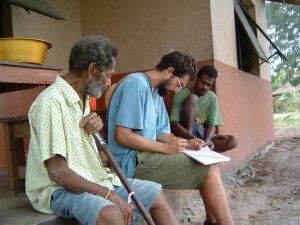Online ethnography for social media research and reporting
Posted on: May 10, 2011
Online ethnography means studying or analysing a social media setting whilst being immersed in it. The roots of ethnography are in anthropology, so I always feel it useful to imagine the curious, intrepid human researcher stepping out into foreign territory and trying their best to make sense of alien surroundings. You are that guy / girl in the shorts with the notepad and the face that doesn’t quite fit.

Well, now we have placed ourselves in the picture, how do we carry out online ethnography?
- Observation: You are trying to make sense of a social situation by reading / listening to people and observing what they do (virtually). This research is thus qualitative, not quantitative
- Field diary: The crucial tool for offline ethnography – this can be useful for online ethnography too. You can read entire conversations and then summarise main themes, characters, etc. in the diary. Try and observe at different times of day and across a spread of settings -you might want to observe at least one thread from every sub-topic, for example. The themes you start to notice can also then be used to develop a more scalable content analysis. A good point of interest can be picking up on community norms, in-jokes, commonly used or community-developed acronyms and jargon
- Participatory choices: Particularly with online ethnography, it is often possible to observe without participants realising we are there. Are you going to participate in the discussion / community / social situation in which you are observing? If you are, you will be able to recount first-hand what it is like to be part of it. However, the act of taking part disturbs the social setting as it was
- Storing conversations: Digital discourse makes for massive data collection opportunities. The sheer volume of material collected can be immense. Therefore, make realistic estimates as to how much you will be able to read in the time you have, and how much it is sensible to collect via copying and pasting / downloading. Be prepared to revise down these estimates once you start the project
- Content analysis: To analyse large-scale conversations, content analysis is a quantitative technique that can complement an ethnography by enabling you to (also) describe what is happening in numbers. This will require conducting initial observations to determine themes you wish to explore. For example, do you want to know how many comments are positive, how many are negative and how many mention directly the subject / product you are interested in? Place these in a matrix / spreadsheet and then keep a tally as you read. This can then give you a result such as 35% of people in the discussion thought the royal wedding was not a valid topic to be posted about on the Facebook page (which is far easier to include in a report)
- Discourse analysis: This is another complementary research method / approach that means analysing what is being said from a linguistic and cultural perspective – most usually revealing, or trying to reveal, motive, mood, irony, humour, meaning, power structures and other such social nuances. Detailed discourse analysis takes a lot of time, so you may have to, again, select a modest sample of the material being studied, to dive in deeper, perhaps at given points in the course of writing the field diary
- Reflexivity: When you conduct ethnography you are an organ of the research. That is, your own biases, cultural prejudices, likes and dislikes will influence how you view what you see. Try as much as possible to consider this – to reveal them in your work (if academic) or try and take account of them as you make choices about what to focus on and subsequent presentation and representation of the observations made. You should not go into an ethnography with the same questions you come out with – you should be, in the midst of carrying out the research, discovering both questions and answers as you draw out insights
- Research partners: Another eye on the social setting can help mediate some of the bias in ethnographic observations. If you and the research partner(s) each carry out observations, for the same amount of time, you can be more confident of a rounded view. However if you are all similar types of people with a similar training / occupation, bear in mind the specific industrial prejudices you may share
- Ethics: Consider whether your research could impact or upset those you are observing. Could the study be seen as a breach of trust, particularly if you have decided to become part of the community? If this research is part of a study for publication in any way, you may wish to reveal to your subjects that you have been studying them. Furthermore, you should consider anonymising all names in the field notes / data collected. Even if the study is for internal, private purposes only, consider how it might look if it got out (no data is ever 100% secure, just ask Sony). If names need to be included in the final write up try using pseudonyms e.g. ab1, ab 2
5 Responses to "Online ethnography for social media research and reporting"
Thank you for this discussion. I found it really interesting. I am currently doing my research which include online ethnography as one tool for data collection. I retrospectively collect the relevant posts and analyse it. I wonder if you can suggest to me a method for analysis.
[…] on one measure alone. If there is time and the blog is very active, you could make more in-depth ethnographic observations on participation […]
Excellent help to me thank you! i am conducting research into the influence that social media has had on fashion retailers for my dissertation. My research methods inlcude observations and I have been looking for a relaible research method in which to observe communications between retailers and consumers via social media. do you think that online ethnography will be the best method? thanks for the insight!





May 10, 2011 at 1:46 pm
Nice, easy discussion of online research. 🙂